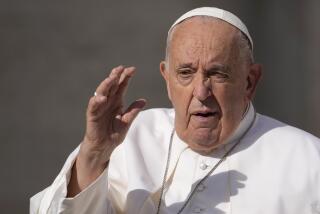Pope Moves to Quell Dissent Over Ban on Female Priests
- Share via
In a dramatic move to end dissent over the Roman Catholic Church’s ban on female priests, Pope John Paul II on Tuesday amended church law to declare for the first time that theologians and others in authority who continue to dissent risk a “just penalty.”
At the same time, the authoritative Congregation for the Doctrine of Faith--the Vatican’s doctrinal watchdog headed by Cardinal Joseph Ratzinger--issued a commentary explicitly naming the ban on female priests, the church’s prohibition of euthanasia, and the rules against sex outside of marriage and warning that those who dissent from Catholic doctrine could be declared “no longer . . . in full communion with the Catholic Church.”
The church has long applied sanctions to those who dissent from core dogmas on issues like the divinity of Jesus Christ or the real presence of Christ in the Eucharist.
But the changes advanced Tuesday for the first time call for unspecified sanctions against those who dissent from a second tier of church teachings--those that are not considered revealed truths, but authoritative doctrines pronounced by the pope and bishops. That tier includes the ban on women as priests, which John Paul pronounced as authoritative in 1994.
Another example of definitive doctrine cited Tuesday by the Vatican--and one that a prominent Catholic theologian said privately could set back the cause of Christian unity--was Pope Leo XIII’s 1896 bull declaring that ordinations of deacons, priests and bishops in the 70-million member worldwide Anglican Communion are null and void.
The new Apostolic Letter, “In Order to Defend the Faith,” “moves the debate a step further than it’s been,” said Father Gregory Coiro, a spokesman for Cardinal Roger M. Mahony of Los Angeles.
“Just the fact they would say there would be penalties and that people who are selectively dissenting might place themselves outside the full communion of the church” is of considerable importance, Coiro said.
From the beginning of his papacy, the 78-year-old John Paul has battled with liberal theologians, particularly on issues relating to the role of women and the authority of the church hierarchy to enforce its teachings. Tuesday’s letter appeared to be a further step to “bring closure of the debate” on that issue, said Father Thomas Rausch, chairman of the theology department at Loyola Marymount University in Los Angeles.
Francis Kissling, president of Catholics for a Free Choice, which argues for the rights of Catholics to dissent on issues of reproductive choice, said John Paul has also made it more difficult for his successor to change the conservative course he has set.
“It’s clearly part of the pope’s desire to put into church law conservative elements that will survive him,” she said.
In Ratzinger’s words, the Vatican itself declared that the pope was acting out of “imperative necessity to prevent and refute the opinions of theologians who resist” definitive Catholic teachings.
The changes in canon law and the accompanying commentary appeared to catch Catholic theologians and priests by surprise.
“Theologians are going to be very concerned about it, because I think it’s threatening them with penalties,” Rausch said.
Although the new sections added to canon law are broad enough to include a wide range of teachings, theologians reached Tuesday said the most immediate and telling effect would be on continued dissent over Rome’s prohibition against ordaining women to the priesthood.
Father Francis Sullivan, a leading authority on the church’s authority who teaches theology at Boston College, a Jesuit institution, said there is little doubt that the Vatican means business.
“What it comes down to is that it makes it clear that the Holy See takes seriously any obstinate rejection of doctrine, such as the exclusion of women from ordination,” Sullivan said. “There’s a canonical penalty.”
The penalties are not specified, but Sullivan said that for theologians they could include an order silencing them or a prohibition on teaching in Catholic institutions.
Although dissenting theologians have been silenced in the past, one canon lawyer said the Vatican would now be on firmer legal ground in moving against those who question not only the core dogma of the church but authoritative pronouncements by the pope and bishops.
“It’s easier to handle [dissidents] because you have some norms you can refer to,” said Father Ladislas Orsy, a canon lawyer and professor of jurisprudence at Georgetown University in Washington.
More to Read
Sign up for Essential California
The most important California stories and recommendations in your inbox every morning.
You may occasionally receive promotional content from the Los Angeles Times.













